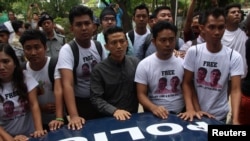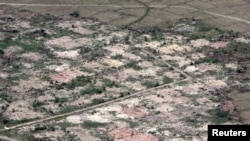A U.N. report accuses Myanmar of using a host of specious laws to prevent independent journalists from doing their job.
The report cites last week’s conviction of two Reuters journalists who reported on an army massacre of Rohingya as a particularly outrageous example of judicial harassment against the media in Myanmar.
The report details many cases of detentions and prosecutions of journalists on trumped up charges across the country, including in Kachin, Shan and Rakhine states. It says a number of ill-defined laws are used in Myanmar to exert control over independent journalists and to deter them from reporting on critical issues.
U.N. human rights spokeswoman Ravina Shamdasani tells VOA there was a lot of hope that press freedoms and freedom of expression generally would improve when the civilian government headed by Aung San Suu Kyi came into existence in 2015.
“However, there is now a real sense of pessimism that this has not happened, and it does not seem likely to happen ... It is hard to know where the orders are coming from, whether this is a matter of policy or it is just the standard operating procedure of many of these officials," said Shamdasani. "So, it is hard to know whether it is the military or the civilian government that is directly implementing a policy to suppress independent journalism.”
Reporters Without Borders reported about 20 journalists were prosecuted in Myanmar in 2017. But Shamdasani says that number does not include private cases that have been initiated on charges of criminal defamation.
She says the use of the law and of the courts by the government and military to suppress independent journalism creates an impossible situation for the media. She says it forces journalists to choose between self-censorship and the risk of prosecution.





